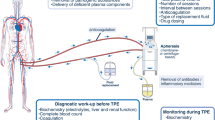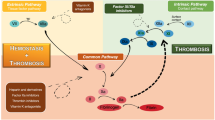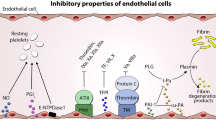Abstract.
Objective and Design: Unfractionated heparin is frequently used as an anticoagulant during blood sampling and in cell culture experiments. In the present study we investigated whether heparin and other anticoagulants (citrate and EDTA) interfered with measurements of plasma tumor necrosis factor alpha (TNFα) concentrations or with TNFα release from endotoxin-stimulated monocytes.¶Material and Methods: TNFα was measured by a WEHI 164 bioassay in the plasma of 16 septic patients anticoagulated with heparin, citrate, or EDTA. Anticoagulants were incubated with the bioassay cell line and cell lysis was monitored. To exclude falsely low TNFα concentrations, anticoagulants were incubated in increasing amounts with human recombinant TNFα/saline solution, and rTNFα recovery was measured either with the WEHI 164 bioassay or an ELISA test. Further, anticoagulants were incubated with monocytes isolated from healthy volunteers and stimulated with endotoxin. Supernatants were analyzed for TNFα with both test systems.¶Results: No biologically active TNFα was detected in the plasma with heparin anticoagulation, whereas with citrate, reproducible, TNFα-induced cytotoxicity was detectable in blood samples of 13 of the 16 patients. Anticoagulation with EDTA resulted in fairly high, variable and poorly reproducible TNFα values. Only EDTA produced falsely high values by unspecific lysis of WEHI cells. Only heparin at a concentration of 20 I.U./ml or more was found to produce falsely low values by interaction with the TNFα bioassay, but also with the ELISA test. In monocyte culture experiments, heparin significantly attenuated the stimulatory effect of endotoxin on TNFα release already at the lowest concentration tested (25 I.U./ml).¶Conclusions: Heparin and EDTA may have significant adverse effects on TNFα measurement when used for blood sampling. Citrate does not interfere with the TNFα bioassay or ELISA, and seems, therefore, to be the anticoagulant of choice. Due to intrinsic interactions with various cell systems (including the WEHI cell and monocytes), one should be careful in using heparin in cell culture studies in which effects of TNFα or of endotoxin are being studied.
Similar content being viewed by others
Author information
Authors and Affiliations
Additional information
Received 19 March 1997; returned for revision 25 April 1997; accepted by E. Neugebauer 9 June 1997
Rights and permissions
About this article
Cite this article
Hoffmann, J., Hartl, W., Faist, E. et al. Tumor necrosis factor measurement and use of different anticoagulants: Possible interference in plasma samples and supernatants from endotoxin-stimulated monocytes. Inflamm. res. 46, 342–347 (1997). https://doi.org/10.1007/s000110050199
Published:
Issue Date:
DOI: https://doi.org/10.1007/s000110050199




